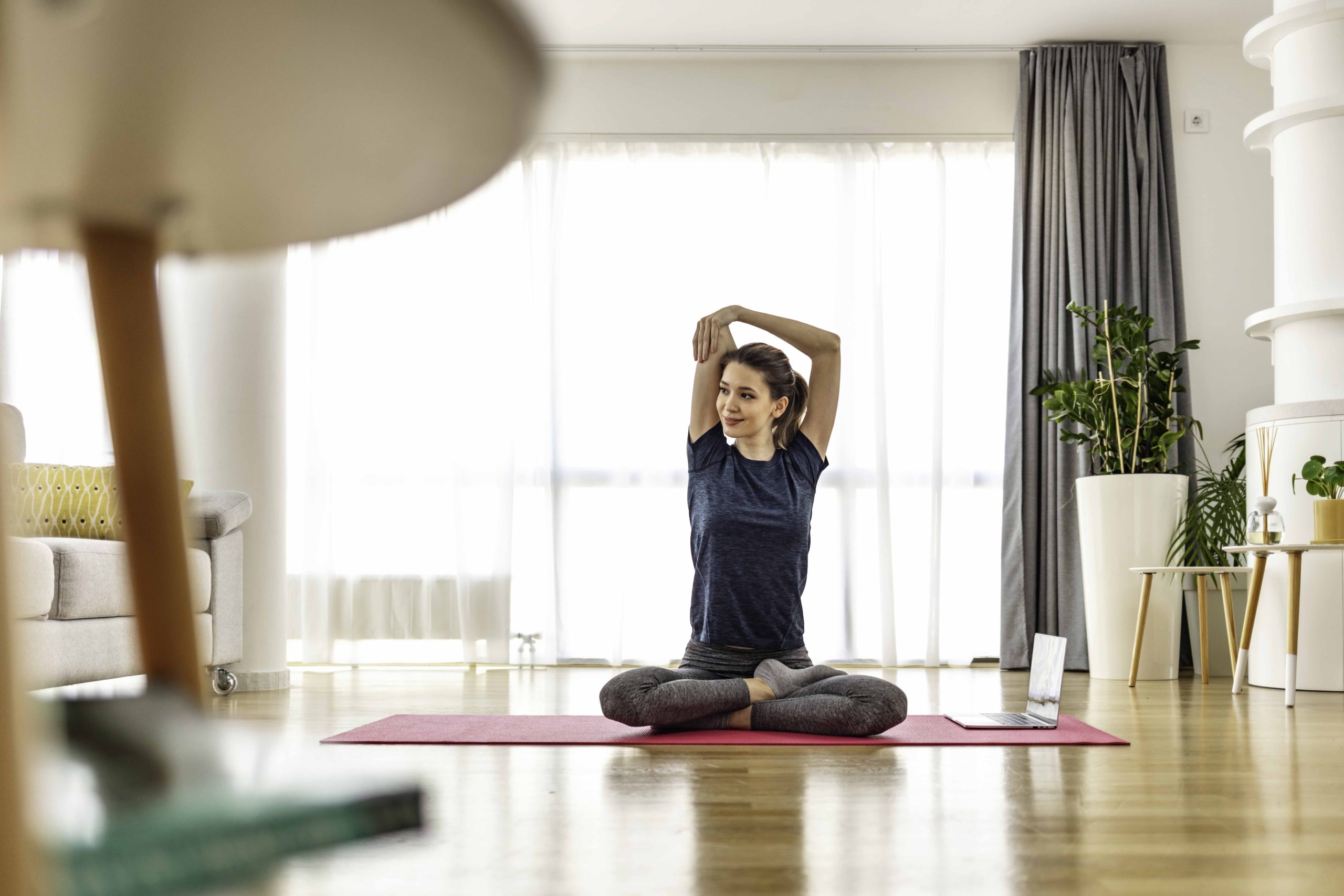Looking for an exercise approach that will give your mind a makeover? Here are the best exercises to support your mental health and wellbeing…
By Emma Lewis
The modern world with all of its challenges, from its fast pace and lack of downtime to pandemics and the resulting uncertainties, can be hard to cope with. However, if you’re finding it tough to manage your mental health and keep on top of stress and anxiety levels, exercise may be just what you need.
According to a large study published in the medical journal The Lancet, people who exercised during the month-long trial period had 43 percent fewer days of poor mental health than those who did not exercise.
All exercise types helped, but the best results were for popular team sports, cycling and aerobic and gym activities. Exercising three-to-five times a week and for 45 minutes at a time was optimum in terms of frequency and duration.
And it seems that, as a result of Covid, more people are prioritising exercising for mental wellbeing and actively seeking out activities that help them feel better.
Indeed, according to a post-lockdown survey by smart bike brand Apex, which polled 500 people aged 25 to 45, four-in-five people said they now exercise to boost their mood and support their mental health, choosing their workout based on the desired psychological outcome.
And over half of respondents admitted that they exercise to support their mental health more now than they did before the pandemic. But why is exercise so good for your mental health and what can you do to help boost your happy hormones?

Why is exercise good for our mental health?
Psychologist Dr Robin Hart explains how and why exercise gives our mental health a helping hand. ‘Our brains and bodies are part of the same amazing machine, and that machine needs a bit of looking after,’ he says.
‘Even gentle exercise has a powerful effect on our physical and mental wellbeing: something as simple as a 20-minute walk can clear your head and give you a better perspective on your situation.’ It’s all down to reducing stress hormones, he adds.
‘Your body’s fight-or-flight response is really handy in a world full of sabre-toothed tigers, but it’s not so great with workplace stress.
‘The same stress hormones designed to prevent us from becoming dinner, such as cortisol and adrenaline, also kick in when we’re dealing with deadlines or difficult clients. Over time, those hormones can have chronic effects on our mental wellbeing. Moderate exercise can help counteract this, though.’
Your body also releases ‘happy hormones’, such as endorphins, during exercise, says Hart. ‘Endorphins are the“feel-good” peptides that our body releases to fight pain. They’re also brilliant mood boosters. If you’ve ever felt euphoric after intense exercise, that’s your endorphins kicking in.’
Exercise can also, of course, distract you from stressors, especially if it’s a sociable activity, such as a team sport, or one that requires you to concentrate hard on what you’re doing.
Another useful knock-on effect of exercise is that it can improve your quality of sleep. Why is this so important? Because lack of sleep is linked to conditions including depression and anxiety.
And, of course, the physical benefits of a regular exercise routine will give you a psychological boost, too. Who doesn’t like feeling stronger and more energetic, and looking more toned?

What are the best types of exercise for supporting mental health?
We all have different preferences when it comes to exercise. So, doing something you enjoy is probably the top priority for supporting your mental health and helping you feel good.
‘Finding the right type of exercise is key, and is personality dependent,’ says Dr Nerina Ramlakhan, a neurophysiologist and sleep expert. ‘While some might opt for the community feel of a gym and group classes, others might prefer solitary exercise such as running.’
It can also depend how you feel at that time, so self-awareness is key. Ramlakhan suggests you ask yourself why you want to exercise. Use questions such as, ‘Do I want to exercise to meet other people, or to let off steam and process my thoughts and feelings at the end of a stressful day?’.
Wellness benefits of exercising outdoors
And don’t forget that exercising outdoors can boost your feel-good feelings even more. A recent study published in the International Journal of Environmental Health Research shows simply being in a park for just 20 minutes is enough to improve your wellbeing.
Still not sure what type of exercise to go for? ‘Shop around and find something that really resonates for you and go for it! For those who like a challenge, climbing or even wild swimming can have a huge mental-health benefit,’ says Ramlakhan. ‘Taking risks in a safe environment can have a significant impact on our fear response and has been shown to reduce anxiety.’
However, do be aware that intense exercise appears to boost stress hormone cortisol rather than reduce it (according to a joint US and Estonian study published in the Journal of Endocrinological Investigation). So, if you’re feeling really stressed, it may be best to choose an activity that doesn’t cause your pulse to race.

How to schedule fitness into your daily routine
Once you’ve decided which activities you’d like to do, schedule them into your routine. Ramlakhan suggests exercising first thing in the morning, even if it’s just for 10 minutes. ‘Plan what you’re going to do the next day on the day before,’ she says.
‘Make it fun and achievable. Telling yourself you’re going to go out for an hour-long run is likely to present too much of a challenge. Instead, set small but realistic goals and do enough, but not too much. This way, you’re more likely to want to come back the next day and do more.’
She suggests simply aiming for your 10,000 steps a day can be a good way to get a fitness habit going. Remember, too, that walking with others can help you banish feelings of isolation as well as motivating you to get out there.
Online exercise classes designed to support your mental health and wellbeing
Try these classes that are designed to support your mental health…
SMASH Self Care Sessions
SMASH offers free, 30-minute self-care sessions on Wednesdays and Sundays via Zoom.
They start with mindfulness, then you’ll do 15-20 minutes of stretches. This is followed by 10 minutes of meditation for a great combo to help you reset. Visit smashmindandbody.com.
Apex Ride Remedies Classes
Apex’s new Ride Remedies classes blend guided meditation and brain-based coaching techniques led by behavioural psychologist Ricky Gill, with rhythmic cycling to a trance beat led by an Apex instructor to deliver ‘meditation on a bike’.
‘Remedies’ include: overcoming fears and moving past limitations, reducing overwhelm, manifesting energy, and building self belief. Bike £1,200, plus membership from £27.50 a month. Visit apexrides.com.
CARiFiT’s Feel Good Friday Community Class
CARiFiT’s Feel Good Friday Community Class is perfect for new mums. Simply strap your baby to your body using a carrier system and enjoy workouts scientifically proven to improve mood, energy and fitness for new mums.
The 30-minute sessions incorporate time for a Q&A with medical, physio, mental-health and fitness experts. Free on CARiFiT TV YouTube channel. Visit carifit.co.uk.
4-week feel-good workout plan
This plan from SMASH Mind and Body will help get you into the habit of exercising to care for your mind and body…

Week 1
Monday: Set your intentions
- What are your top self-care priorities for the next 4 weeks?
- 30-45 minutes: Join or create a short workout that focuses on FUN!
Tuesday: Get out into nature
- Know that obstacles may get in your way but you can overcome them.
- 15-30 minutes: Get outside for a walk or jog.
Wednesday: Reflect and adjust
- How is your week going so far?
- 15-30 minutes: Join a yoga or Pilates class to focus on your inner strength.
Thursday: Add some focus
- Take some time to meditate.
- 30-45 minutes: Embrace your amazing body and get your blood pumping in an online workout.
Friday: Celebrate!
- Celebrate yourself!
- 10-30 minutes: Dance! Put on your favourite song or playlist and boogie!
Saturday: Have time for you
- It’s not selfish to make time for yourself.
- 15-30 minutes: Join a yoga class or find a follow-along stretching workout.
Sunday: Reflect on the week
- Listen to your body. Always take at least 1 day of rest. Is that what you need today?
- What are you most thankful for this week?

Week 2
Monday: Set your intentions
- What is your main intention for this week?
- 30-45 minutes: Aim to get your heart-rate up with a workout soundtracked to your favourite songs!
Tuesday: Get out into nature
- Focus on how your breath feels in your body today.
- 20-40 minutes: Try a new walking/running route today.
Wednesday: Reflect and adjust
- Remember, it is ok if plans need to be amended.
- 20-40 minutes: Have a strength-based workout. It can be your own bodyweight or with weights.
Thursday: Add some focus
- Schedule some space for uninterrupted focus time.
- 30-45 minutes: Join a fitness class or follow a workout and remember how gorgeous you are!
Friday: Celebrate!
- What have you done today that has made someone smile?
- 10-30 minutes: Spend some time outside taking in the world around you with awe!
Saturday: Have time for you
- Maybe read a chapter of a good book.
- 15-30 minutes: Be mindful of what your body needs. Get your heart rate up, or take some time to just be.
Sunday: Reflect on the week
- Do an extra 10 minutes of meditation today, focusing on loving kindness.
- What did you learn this week?

Week 3
Monday: Set your intentions
- Are there any habits you need to prioritise this week?
- 30-45 minutes: Start your week off with some energy. Get sweaty and enjoy what your body can do!
Tuesday: Get out into nature
- See how many different animals you can spot today.
- 30-50 minutes: Take a slow mindful walk, noticing everything around you.
Wednesday: Reflect and adjust
- How is your month going so far? Take this time to reflect on your intentions.
- 20-40 minutes: Focus on core strength today, including your lower back.
Thursday: Add some focus
- Taking regular breaks from work can help up your focus.
- 30-45 minutes: Create or join a workout that gets your heart-rate up.
Friday: Celebrate!
- Enjoy what your body can do! What are you proudest of this week?
- 5-10 minutes x 5: Today take a break from your schedule and move for a few minutes at a time.
Saturday: Have time for you
- Take some time to do a body scan today.
- 15-30 minutes: Take some time to stretch or follow a yoga class.
Sunday: Reflect on the week
- Switch off and relax today. You are amazing!
- Who are you most thankful for this week? Could you let them know?

Week 4:
Monday: Set your intentions
- What positives did you learn last week that you can bring into this one?
- 30-45 minutes: Join a fitness class or make a workout that fills you with joy!
Tuesday: Get out into nature
- Find joy in the beauty of nature and remember how amazing you are.
- 20-40 minutes: Embrace a walk or jog in your local area.
Wednesday: Reflect and adjust
- Always listen to your body. Take rest when you need it.
- 30-50 minutes: Practise some yoga or Pilates and remind yourself how strong you are.
Thursday: Add some focus
- Spend time away from social media during periods of the day.
- 30-45 minutes: Channel your energy into a fun workout and move your body to some fun music!
Friday: Celebrate!
- What positives have you experienced this week so far?
- 10-30 minutes: Dancing is such a fun way to move your body. Put your favourite album on and dance!
Saturday: Have time for you
- Maybe take some time to write down how you have been feeling this month.
- 15-30 minutes: If you have an outside space, take some time there to stretch and move mindfully.
Sunday: Reflect on the week
- Do a body scan. Be conscious of what your body needs and where the main areas of tension are.
- What have you learnt about yourself over these past few weeks?







